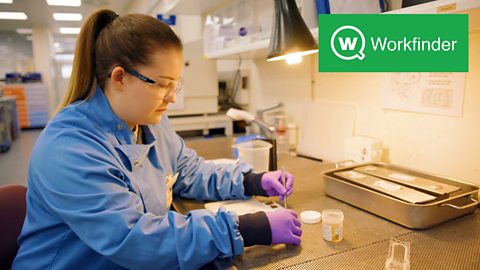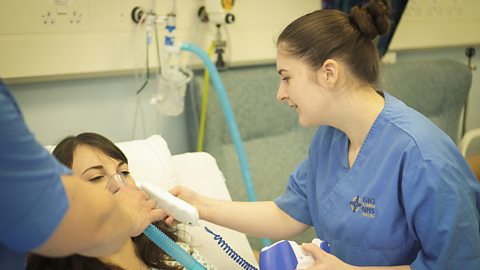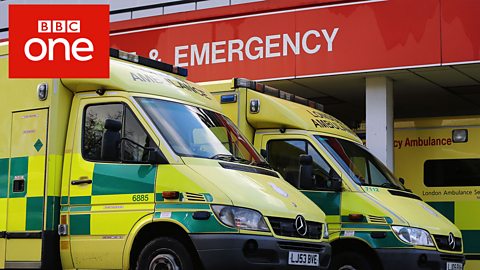Meet Matt, 38, and find out about life on the frontline of emergency medical care. Matt splits his time between working in A&E and attending the most serious medical incidents by helicopter. Part of our Bitesize world of work series.
Matt:
I'm Matt. I'm 38. I'm an A&E consultant and I also fly with a Northwest Air Ambulance.
I spend my whole day just trying to make people feel better and get better. Often we don't have a lot of time in emergency situations when people are really unwell. You have to be able to join together really quickly and to work towards one goal. We have a massive team to get people better really really quickly and all the equipment we could ever wish for. It's quite different from when we’re working on the helicopter. It's just you and a paramedic and you can sent to possibly anything. There's a couple of thousand 999 calls in a day. We only get sent to about 10 or 12 of them. Usually big car accidents, falls or stabbings and we bring all of the A&E right to where they've got injured, with the idea being that if you’re really really sick, if we can give you blood or give you that anaesthetic or the emergency surgery at the side of the road it makes a much bigger difference and can try and save your life.
When you’re just about to land at a job, you can see overhead how big an accident is, that makes it a little bit frightening. So, you know, you're going to try and take a deep breath and be calm to try and figure out the best way to do it as quickly as we can and to try and keep people alive or to get people going again.
Matt's colleague:
Matt’s a really good doctor to work with. He brings lots of skills and experience to the job but he doesn't make very good coffee.
Matt:
I've been flying in helicopters now for nine years. It's an amazing job. It's not always been an easy journey. At school I found it difficult to concentrate and focus but once I had a goal and I knew that you needed to get good grades to get into medicine I really had something to focus on. Learning science is just like any other subject, you don't need natural ability. What you do need is lots and lots of hard work but the other good grades that you have to get doing something that you love something that you're enthusiastic in. The most important thing is to get experience of what being a doctor's like. Approach your GP, go to your local A&E and ask if you can do work experience. That's the advice I give. Get motivated, realise what you want and then go for it.
I spend my whole day just trying to make people feel better and get better.
- Matt's role as a HEMS (Helicopter Emergency Medical Service) doctor is very varied. He splits his time between treating patients in A&E and flying by helicopter to provide hospital-level care at the scene of major incidents like stabbings and road traffic accidents
- His journey hasn't been easy. At school, he found it difficult to concentrate. Realising he wanted to be a doctor gave him something to focus on and he turned his grades around thanks to a lot of hard work
- The success rates in recovery from pre-hospital intervention are why Matt loves working on the air ambulance.

A similar role to an air ambulance doctor is a hospital doctor. Hospital doctors diagnose and treat illness and disease in patients admitted to hospital.
What to expect if you want to be a hospital doctor
- Hospital doctor average salary: £29,384 to £78,759 per year
- Hospital doctor typical working hours: 42 to 48 hours per week.
What qualifications do you need to be a hospital doctor?
You can get into this role via a university course. You'll need to complete:
- a 5-year degree in Medicine, recognised by the General Medical Council
- a 2-year general medical foundation programme
- a 5 to 8 year specialty training programme, the length dependent on which specialty of medicine you choose
If you already have a degree in a Science subject (minimum upper second), you could take a 4-year graduate entry programme into medicine.
If you don't have qualifications in Science, you may be able to join a six-year degree course in Medicine. This includes a one-year pre-medical or foundation year.
Sources: LMI for All, National Careers Service, NHS Health Careers
This information is a guide and is constantly changing. Please check the National Careers Service website and the NHS Health Careers website for the latest information and all the qualifications needed.
The British Medical Association (BMA) – is a professional body that supports doctors in the UK. They have lots of information and advice about becoming a hospital doctor, from getting in to medical school to working life as a doctor.
For careers advice in all parts of the UK visit: National Careers Service (England), nidirect (Northern Ireland), My World of Work (Scotland) and Careers Wales (Wales).


Work experience in your area
Find work experience placements with Workfinder.
Tips and advice
Help with interviews, writing a CV and all things work experience related.


Sarah: critical care staff nurse
Sarah works as a staff nurse in a critical care unit in Cardiff.

Laura: 999 call taker. video
Laura and her colleagues are the first people you speak to if you call an ambulance.

Khadija: first aider
Khadija uses her medical knowledge to teach young people first aid.

